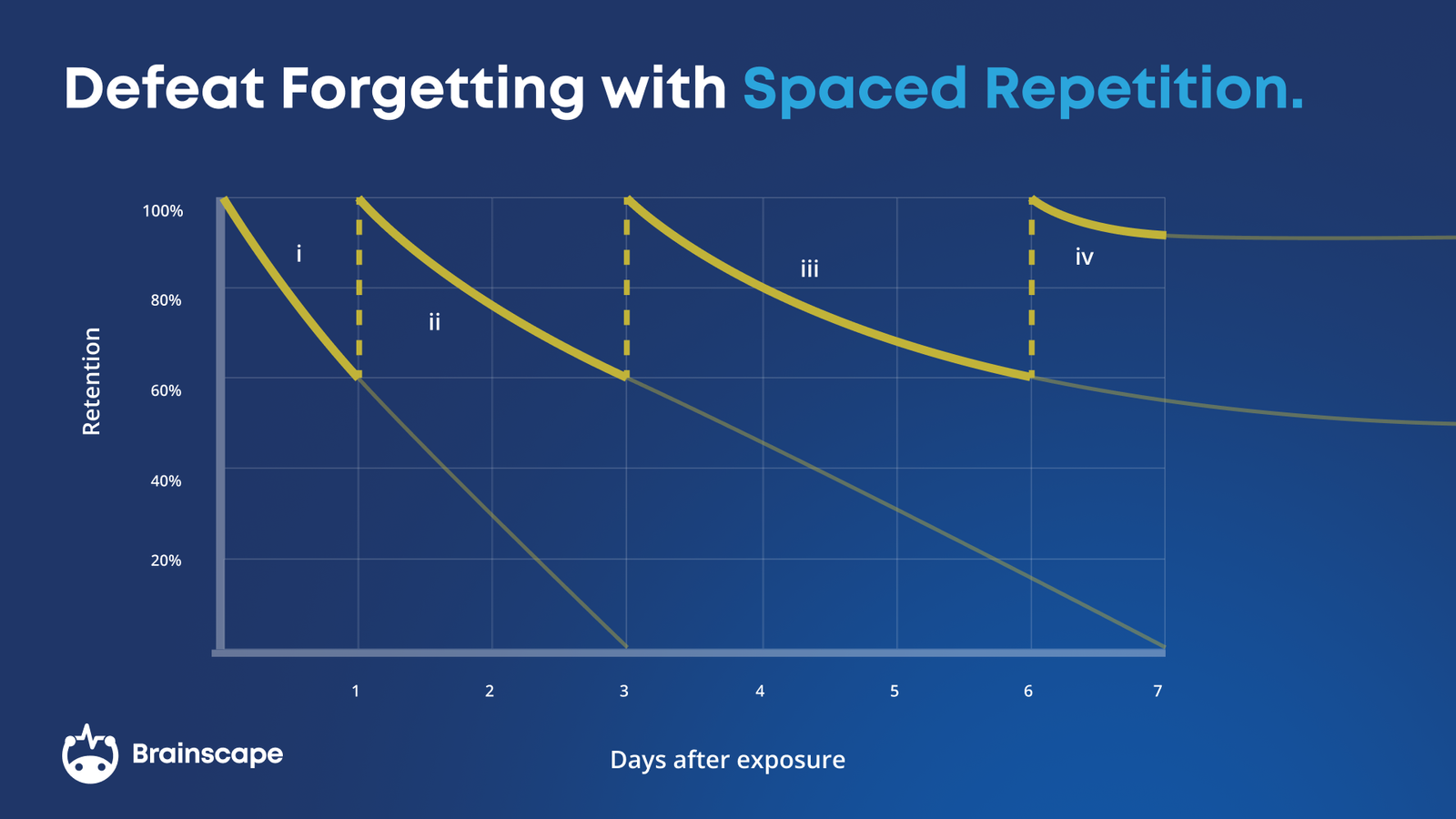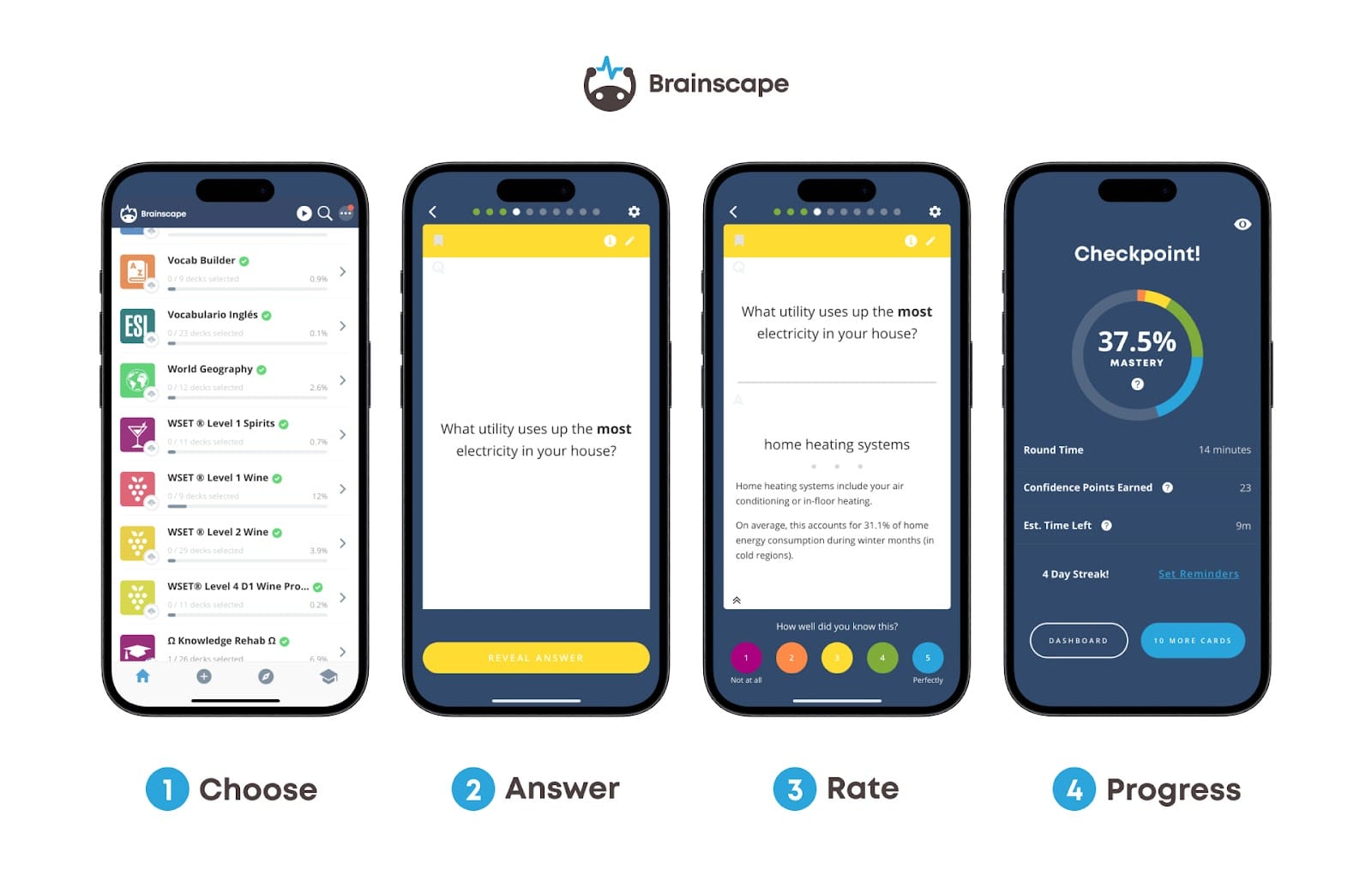Let’s face it, life can get chaotic. Between school or college, work, social life, and sifting through a dozen streaming services for your next binge-watch, finding time to study can feel like you’re trying to fit a grand piano into your car.
And you drive a scooter.
But don’t panic!
Flashcards—particularly digital or online flashcards—can save the day / semester / exam / entire degree program. And while they aren’t a magical cure for procrastination (sorry, you still need to crack open those textbooks), flashcards can help you study so much more efficiently, making even the busiest schedule feel less overwhelming.
(Here’s a super helpful guide on making effective flashcards.)
So, let’s take a quick look at how online flashcards can help you learn (and remember) so much faster when you have no time to study.
TL;DR: Top ways flashcards save you time on studying
In case you’re in a rush, here’s the “TL;DR” (too long, didn’t read) of this whole article. But if you’re in it for the #science, read on!
- Leverage cognitive science: Flashcards use spaced repetition and active recall to help you learn faster and retain information longer.
- Maximize downtime: With digital flashcards, every spare moment—waiting in line, commuting, or grabbing a coffee—becomes a productive study session.
- Focus on weak spots: Adaptive algorithms prioritize the concepts you struggle with, so you’re not wasting time on material you’ve already mastered.
- Encourage bite-sized learning: Flashcards break information into digestible chunks, reducing overwhelm and increasing efficiency—ideal for when you have no time to study!
- Boost long-term retention: Flashcards aren’t just about cramming—they’re designed to help store knowledge in your long-term memory vault.
Also, watch this video...
Still with me? Excellent! Let's dig into...
Why online flashcards are your secret weapon
If you’ve ever crammed for a test by re-reading your notes for the twentieth time, only to blank out during the exam, you’re not alone. That’s because passive studying (like reading) doesn’t force your brain to engage with the material, whether you have months of prep or no time to study.
Flashcards, on the other hand, compel you to actively recall information. They do this by asking you a question based on the material you’re trying to learn. You then need to try to remember the information from scratch.
At first, you may draw a blank, but with repetition, the facts will ingrain themselves deeper and deeper into your memory until they become a permanent part of your knowledge bank!
How does this differ from passive learning? Active recall establishes a deeper neural pathways to the information you’re learning than simply reviewing the material (by reading) or recognizing it (by answering multiple-choice questions).
It doesn't matter how old you are. Active recall improves memory retention for adults and kids alike.
And the best part? You can use online flashcards anytime, anywhere. Waiting for your coffee to brew? Flashcards. Sitting on the bus? Flashcards. Stuck in a three-hour lecture you’ve already tuned out of? Yep, flashcards. (Although we don’t recommend the latter, it is better than doom scrolling.)
Flashcards—especially digital flashcards, which you can conveniently study through an app like Brainscape or Anki—are a powerful and efficient tool for reinforcing information you’ve already been exposed to (in class or after making notes). In fact, they’re proven to help you retain information twice as fast as those passive methods I mentioned before!
(P.S. No time to study (or anything else)? Check out our top tips on life hacks that take NO TIME at all.)
How online flashcards squeeze the most learning into the shortest time
You might be wondering: why are online flashcards better than my usual study methods?
In short: flashcards are the perfect vehicle for a plethora of learning tactics that have been shown to speed up learning and retention:
Spaced repetition
This is the repetition of concepts at specific time intervals that correspond with how well you understand them. So, if you know a concept well, you set that flashcard aside and don’t look at it again for a while. But if you don’t know a concept, you review it again more frequently.
Online flashcard apps like Brainscape automate this process with in-built spaced repetition algorithms. Instead of trying to sort paper flashcards into different piles, the app will show you the exact flashcards you need to see right as you’re about to forget them.

How do these algorithms know when you’re about to forget something?
Simple: you tell them! Which brings me to the next point…
Metacognition
Online flashcard apps require you to rate how well you know the answer to every flashcard. In Brainscape’s case, you rate your confidence on a scale of 1 to 5 with 1 being “I didn’t know this at all” and 5 being “I knew this perfectly” with 2, 3, and 4 being increasing shades of mastery.
(This is what then informs the spaced repetition algorithm how frequently to show you that card again.)
Every time you self-reflect on how well you know a flashcard you engage a cognitive tactic called metacognition (thinking about your thinking), which establishes a deeper memory hook to the information, thereby facilitating more rapid retention.
Active recall
We discussed this earlier under the topic “Why online flashcards are your secret weapon” but to refresh your memory: flashcards compel you to recall information from scratch—without cues—which strengthens those neural pathways. It’s like a workout for your brain, but without the sweat.
Focused on weaknesses
By drilling you on the concepts you’re weakest in, online flashcards save you time on reviewing the information you already know well. They concentrate your study time around your weaknesses, which is a much more efficient way to learn.
Bite-sized learning
It feels so much more effortless to eat a bowl of macaroni & cheese than an entire pan of it. Flashcards break down information into manageable chunks, so you’re not overwhelmed by dense pages of notes. It's the fast food of studying, except it's way healthier for your brain.
Together, all of these tactics transform your study sessions, making even just a five-minute flashcard round super impactful on your learning.
And if you’re opportunistic with using your flashcards whenever you have five minutes between classes, 10 minutes on the bus or train, or 15 minutes in your doctor’s office, you’ll be able to get so much more productive learning done every day!
The best online flashcard app
When it comes to maximizing every minute of study time, Brainscape does more than just streamline your online flashcard experience. It transforms it.

With spaced repetition built right into our flashcard app, Brainscape’s digital flashcards make sure you’re seeing the information you need, exactly when you need it—just before you’re about to forget it. This approach doesn’t just save you from wasted study time; it helps store knowledge in your long-term memory, so you’re ready when it counts.
Brainscape also taps into active recall by quizzing you on each card and asking you to rate your confidence. This feedback loop sharpens your focus on what you’re struggling with, helping you learn more efficiently by cutting through the fluff and drilling down to what matters most.

With Brainscape, you can turn those in-between moments—waiting in line, commuting, or grabbing a coffee—into study sessions that actually make a difference. So, if you’re looking to make every second count, try Brainscape and transform your flashcard game into a serious study advantage.
Finally, Brainscape eliminates the pain and inertia of starting studying. Once you have created or found the flashcards you need, all you have to do is tap the big blue “Study” button and you can pick up exactly where you left off (Brainscape syncs automatically across all your devices). Removing the boring obstacles makes you more likely to stick to your study goals.
Conclusion: Online flashcards stretch the limits of what's possible
When there’s no time to study, online flashcards can be the tool that makes the impossible… possible. They’re quick, portable, and efficient, making them the ideal study companion for anyone with a jam-packed schedule. Just remember, flashcards work best when you’ve already learned the material and are ready to actively engage with it.
So, whether you’re cramming for finals, prepping for a big exam, or just trying to retain info for next week’s pop quiz, online flashcards can help you maximize your study time—even if you only have a few minutes to spare.
Happy studying!
Here are some other study guides we think you’ll love!
- The science of never forgetting: Spaced repetition for fast learning that lasts
- 10 Top productivity apps to organize your study and work life
- Small life-changing habits that take ZERO time
- How to study while exercising
Sources
- Ebbinghaus, H. (1913). Memory: A contribution to experimental psychology. New York: Teachers College, Columbia University.
- Lally, P., & Gardner, B. (2013). Promoting habit formation. Health Psychology Review, 7(sup1), S137-S158.
- Orbell, S., & Verplanken, B. (2010). The automatic component of habit in health behavior: Habit as cue-contingent automaticity. Health Psychology, 29(4), 374.
